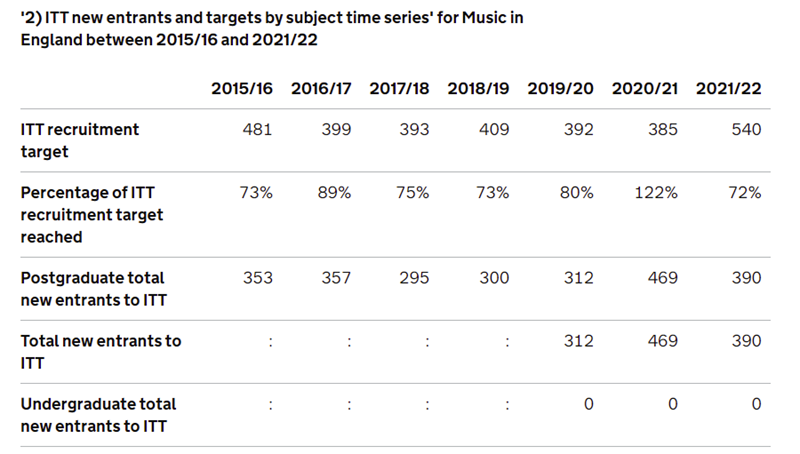Music teacher trainee numbers fall short of new recruitment targets
Harriet Clifford
Friday, December 3, 2021
The 2021/22 target is higher than previous years following the introduction of a new modelling system in 2020.

kasto
Provisional data on initial teacher training (ITT) entrants for the academic year 2021/22 in England shows that music has seen one of the ‘largest decreases’ across subjects in performance against targets compared to last year.
Published by the Department for Education (DfE) as part of the ‘Initial teacher training: trainee number census 2021 to 2022’, the data includes the percentage of the Postgraduate Initial Teacher Training (PGITT) target achieved for all subjects.
72 per cent of target reached
In the current academic year, ITT courses for music saw 390 new entrants – 72 per cent of the recruitment target, which is currently set at 540.
Last year (2020/21), 469 recruits far exceeded the much lower target of 385, resulting in 122 per cent of the ITT recruitment target being reached for music.
The number of recruits this year (390) compared to last year (469) still reflects a decrease of 79 trainees, although there was an ‘unprecedented increase’ in new entrants to ITT across all subjects in 2020/21. This has been directly attributed to the impact of COVID-19.
Compared to 2019/20, pre-pandemic, entrants for music have increased this year from 312 and have remained relatively stable since 2015/16, when there were 353 entrants.

Table showing statistics for music, created using the Table Tool on the government website
Not ‘sufficient’
The government analysis of the data warns against directly comparing the 2021/22 PGITT targets with the 2020/21 targets, as changes were made to the way these targets are calculated in 2020.
Used by the DfE to estimate the number of postgraduate trainee teachers needed to provide ‘sufficient numbers’ of qualified teachers in English state schools, the Teacher Workforce Model (TWM) replaced the Teacher Supply Model (TSM) last year.
The new TWM considers both recruitment and retention alongside estimates of demand, and, for the first time this year, has been used by the DfE to set the ITT targets.
The difference between the number of music trainees recruited and the new DfE target of 540 suggests that the current number of recruits may not be ‘sufficient’.
Warnings have been issued this year over falling numbers of music trainees if the new ITT reforms are to come into effect. The government has recently announced that the reforms have been pushed back to 2024.
'Take action'
Dr Rebecca Berkley, associate professor in music education at the University of Reading, said: 'It is hard to read this evidence as anything other than a significant attack on music as a subject by this government.
'When you consider this significant under recruitment in trainee music teachers, and the proposed 50 per cent reduction in funding for music in Higher Education, it does make one wonder where the music teachers of the future are going to come from.'
She added: 'I urge the government to take these numbers seriously: read the copious amounts of evidence being supplied by academic and professional colleagues across the UK about the damage that educational policies like the EBacc and data driven school improvement have already done to music in schools.
'Take action to repair this damage so that the current generation of children may receive their entitlement of music teaching at KS1, 2, and 3 as enshrined in the Music National Curriculum.'
Deborah Annetts, chief executive of the Incorporated Society of Musicians, a UK subject association for music, said: 'The news that recruitment targets for music teachers have been missed this year is disappointing as the ISM’s 'State of the Nation' highlighted the already falling number of music teachers in recent years.
'Therefore, the government should urgently look again at its decision not to include music as one of the subjects included in the bursary scheme for trainee teachers.'
She added: 'A career as a music teacher can be highly rewarding and if the government is to meet targets in the future, they must appreciate the highly skilled work that specialised music teachers do and give music education and music teachers the status they deserve.
'Music education is disappearing from schools at an alarming rate and ministers should take urgent action to reverse this decline.'
In October, the government U-turned on ITT bursaries previously removed, but did not reinstate the bursary for music.
The ITT census can be found here.





